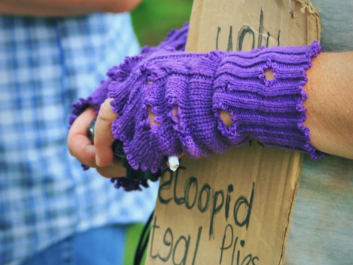Coming Home: Homelessness Among Trans People in the EU

A quarter of trans people in the EU report having experienced homelessness or housing difficulties in some form, including sleeping rough, at a friend’s house, or in a shelter, at some point in their lives. The share is higher for younger trans people, trans people with migration or ethnic minority backgrounds, and trans people with disabilities. At the same time, trans people face an inaccessibility of housing: one-fifth of trans respondents to the 2019 EU Fundamental Rights Agency LGBTI Survey reported experiencing discrimination when looking for housing in the 12 months preceding the survey.
Why is this the case? Structural discrimination that creates barriers to education and stable employment forces many trans people into cycles of poverty, homelessness, and violence that can be hard to escape. Young trans people are at significant risk of experiencing family rejection and being kicked out of their homes. Trans people who become homeless may experience further violence and violation of other human rights, and face additional barriers to access healthcare, education, and employment that might otherwise have the potential to free them from the cycle.
Despite being so widespread, trans people’s experiences with homelessness is grossly under-researched and the needs of vulnerable trans people are too often not considered in mainstream housing and emergency accommodation programs. Trans-led organisations and drop-in centres, on the other hand, are the first port of call for many trans people in crisis.
Why this brief and what can I find in it?
The policy brief “Coming Home: homelessness among trans people in the EU” intends to raise awareness of the current situation of trans people and homelessness in Europe among the general public, trans advocates, and other stakeholders working at national, regional and EU level. It will describe how trans people experience homelessness, why trans people are vulnerable to poverty and homelessness, and the impact of the COVID crisis; the actors currently working to eliminate homelessness among trans people and what they are doing; and it will identify the needs of the community, possible solutions, and finally draw up policy recommendations.
TGEU calls on the EU to:
- Ensure that public funding for housing and other poverty support services, including from the ESF+, ERDF, and FEAD, is tied to the condition of being trans-inclusive.
- Promote projects that support employment and social integration for the most vulnerable within the trans community.
- Support research on trans homelessness with meaningful community involvement and in collaboration with local actors.
- Directly tackle transphobic rhetoric and legislation coming from Member States’ governments and national media.
TGEU calls on national governments to:
- Intervene to end speculation in the housing sector and ensure housing policy benefits those vulnerable to homelessness and exclusion from housing, including trans people, undocumented migrants, and sex workers.
- Ensure COVID-response measures seize the recovery period to transform homeless policy to support trans people experiencing homelessness.
- Fund organisations that are supporting trans people find housing and employment, focusing on marginalised groups within the trans community.
- Ensure social and unemployment services are available to trans people also working in the informal sector and those who move within the country.
- Introduce quick, transparent, and accessible legislation for legal gender recognition based on self-determination.
- Coordinate and collaborate with local governments, municipalities, and local trans organisations in providing services for trans people.
TGEU calls on municipalities to:
- Work with and fund trans organisations that provide support services for poor and homeless trans people already.
- Stabilise rental prices and increase the housing stock of affordable housing.
- Establish housing-led programs that target vulnerable trans populations and reach out to trans drop-in centres to connect trans people in need with housing.
- End forced evictions for trans people affected by the COVID pandemic.
- Ensure emergency shelters and other accommodation services are safe places for trans people that respect and protect their dignity. This means:
- housing trans people based on their self-identified gender identity;
- having separate beds put aside for trans people;
- ensuring intake forms and protocols are trans-sensitive; and
- establishing clear anti-transphobic and anti-racist policies.
- End criminalisation of homelessness, including begging bans and anti-homeless infrastructure.